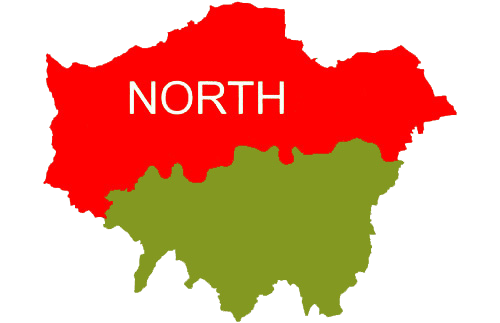
 London North is the main residential area for those living within the Greater London boundaries. 62% of the population of London live in the area north of the River Thames.
London North is the main residential area for those living within the Greater London boundaries. 62% of the population of London live in the area north of the River Thames.
London North represents an amalgamation of many famous hospitals, some of which were merged, for administrative purposes, following the 1992 Tomlinson Report. For further information about training in London North, you can email the Trainee Representatives on the Regional Advisory Committee using the links below:
Email Radha Sehgal (for NW region) Email Pramit Khetrapal (for Cent & E region)
Latest News
North London Regional Training Meeting will take place on 16 May 2025 from 09:00 to 17:45 at the Holiday Inn, Regents Park, London W1W 5EE.
The meeting has been award 6 CPD points by BAUS and will be followed by a drinks reception and dinner.
Training Hospitals
| London North hospitals involved in deanery training are: |
- Barnet General Hospital
- Charing Cross Hospital
- Chase Farm Hospital, Enfield
- Hammersmith Hospital
- Hillingdon Hospital
- Homerton University Hospital
- King George Hospital, Ilford
- North Middlesex University Hospital
- Northwick Park Hospital
- Queen's Hospital, Romford
- Royal Free Hospital, Hampstead
- Royal London Hospital, Whitechapel
- Royal Marsden Hospital
- St Mary's Hospital, Paddington
- University College London Hospital
- West Middlesex University Hospital
- Westmoreland Street Hospital (UCLH)
- Wexham Park Hospital, Slough
- Whipps Cross University Hospital
- Whittington Hospital
The TPDs for London North can be emailed using the links below:
Mr Shalesh Kulkarni (Cent & E area)
Mr Alvan Pope (NW area)
|
PLEASE NOTE: the training programme for all urology trainees in the capital - London North and London South - is now overseen by Ms Susan Willis, based at Guy's & St Thomas' Hospital, London

Training Programme
Being such a large deanery all subspecialties are covered, with provisions made for trainees to gain general training at DGH’s and subspecialty training at the many large teaching hospitals.
Since London North is now a combined deanery with London South, you can choose a training attachment in any London hospital.
Teaching Programme
The teaching programme for the London Deanery has seen a significant overhaul over the past few years. There is now a joint, all-day teaching on alternate Fridays during academic term time.
The teaching programme mirrors the FRCS Urology curriculum, and all topics are covered over two years. The highlights of the teaching programme include “free” attendance at the Royal Marsden, Royal Society of Medicine and Epsom Andrology Meetings. These are delivered by experts from the UK, and often feature international speakers.
In addition, for the past few years, additional laparoscopic & surgical simulation training days have been added to the training programme, partly as a result of a drive from the trainees themselvess. Attendance at the teaching programme is mandatory, and all hospitals within the rotation protect the Friday teaching time to ensure that no clinical activities are booked.
At the end of each year, there is an in-house, written exam and mini-viva.
Research and Audit
Trainees should have no issues in achieving their CCT requirement for research and audit.
Because of the presence of multiple medical schools in the deanery, opportunities for research are plentiful. The deanery is also very supportive of an Out-of-Programme Experience for Research (OOPR), with many trainees completing a higher degree (e.g. MD or PhD).
If you are specifically interested in pursuing research, please click the link below to email Taimur Shah, the North London Research Representative:
Email Mr Taimur Shah

The Bottom Line
The six boroughs that make up North London are currently home to more than 1.4 million people. This is a larger population than many UK and European cities. and the district is one of the most multi-cultural areas in Britain with an even greater diversity in residential areas.
North London may not be teeming with high-end designer boutiques like its West End counterpart, but there are many areas that offer you and your family enough of an incentive to spend your hard-earned cash close to home. With much of the area currently being redeveloped and spruced-up, London North's appeal is increasing almost as fast as its population.
Although it is often said that London trainees do not get as much training as their “non-London” counterparts, the information above should change your mind. Exposure to both core and subspecialty urology is easily found, with many expert trainers and, by ST5, you will have achieved your core logbook numbers and can then spend 1-2 years in sub-specialist training posts. To get the most out of this deanery, your best advice is to be be proactive and pick potential rotations one or two years in advance, to ensure they meet all your CCT and personal goals.
Overall, London is a large deanery with a lot of trainees; this makes the rotations both sociable and educational. Patients travel from far and wide for urological care at the many London institutions, and this is a testament to the high level of clinical care being provided. London hospitals are at the forefront of research and evidence-based practice, and have been early adopters in many of the new technologies in urology.
Although London has a large number of potential patients, the hospitals that make up the London North rotation are relatively close to one another, thus making travel to and from different hospitals easy during your time as a trainee.
Contacts & admin info for London North
← Back to Deaneries & Reps page